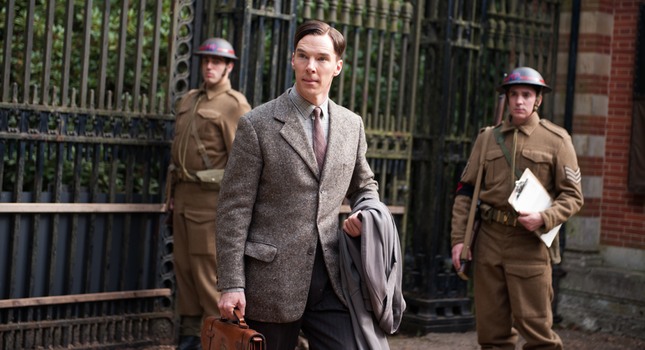
British mathematician, logician, cryptanalyst, philosopher, computer scientist and mathematical biologist, Alan Turing, took up Rejewski’s work during the war and devised a number of techniques for breaking German ciphers at the top-secret Government Code and Cypher School at Bletchley Park. His work included making significant improvements to the Polish bombe method making a machine that was capable of breaking 3,000 Enigma-generated naval codes a day as a part of the Allied war efforts’ Project Ultra, which has been described as being instrumental in bringing about the end of World War II by Winston Churchill. Conversely, he went on to be prosecuted for homosexuality in 1952, at which time it was still a criminal offense in the UK. When he was given the choice of a prison sentence or chemical castration he opted for the latter, before being found dead in 1954, with the inquest recording his death as suicide from cyanide poisoning.
It is this real life story of incredible triumph and shockingly narrow-minded tragedy that is to be retold in the upcoming release of The Imitation Game. With Benedict Cumberbatch (The Hobbit: The Battle Of The Five Armies) in the lead role as Alan Turing and a raft of rave reviews for its initial screenings throughout the film festival season, it went on to be a film that gives the brilliance of Turing’s work and the sheer indecency of his treatment after the war a credible platform of reiteration. While Turing’s life is rightfully celebrated in the modern day, it is the injustice of his last few years that will forever be a cross on society’s collective conscience and the movie should hold both up in equal measure.
Release date
The Imitation Game had a UK release date of the 14th November 2014, with the general release in the US following it on the 21st November 2014. It initially premiered at the 2014 Telluride Film Festival, but it has also been screened at the Toronto International Film Festival where it picked up the People’s Choice Award for Best Film, alongside an abundance of impressive reviews.
The DVD, Blu-ray and digital download release date was on the 9th March 2015, having arrive with enough time for the Oscar results to take their toll on its potential popularity as it went head to head with The Theory Of Everything and the other big releases in contention for the Best Picture Academy Award.
Storyline
Alan Turing, a brilliant mathematician and cryptanalyst, arrives at the the Government Code and Cypher School (GC&CS) at Bletchley Park, Britain’s war effort code breaking centre, to help in the fight to crack intercepted messages that have been encrypted by the German Enigma Machine. His work as a part of Project Ultra goes on to become of critical importance to the defeat of the Nazi military, helping to bring about the end of WWII and saving many lives from the attack of the German Army and Navy.
However, this story of incredible contribution is counterbalanced in The Imitation Game by the terrible treatment of Alan Turing by the governments that he helped to save. The frenetic energy and determination that surrounds the first half of the movie transitions into the sad culmination of his life after the conviction for gross indecency and the subsequent hormonal treatment designed to reduce his libido.
Cast
In addition to Benedict Cumberbatch in the central role of Alan Turing, the film also stars Keira Knightley (London Boulevard) as fellow cryptanalyst at Bletchley, Joan Clarke, who Turing was briefly engaged to. Mark Strong (Kick Ass) plays Major General Stewart Menzies, Chief of MI6 from 1939 to 1952, Charles Dance (Child 44) plays Cdr. Alastair Denniston, the first head of the Government Code and Cypher School, and Rory Kinnear (Black Mirror) plays the detective investigating Turing in 1952.
Tuppence Middleton (Black Mirror Series 2), Victoria Wicks (Doctor Who – The Fires of Pompeii, Series 4) and Allen Leech (also in Black Mirror) were also cast in the film.
Production
The Imitation Game has been directed by Norwegian film director Morten Tyldum, who makes his English language debut on the movie. The screenplay was written by another relative newcomer, Graham Moore, who became hot property in 2011 when his script for the film topped the famous Black List of the top motion picture screenplays not yet produced. Music has been created by the great Alexandre Desplat (The Grand Budapest Hotel) and the film has been edited by William Goldenburg, who won the Academy Award for Film Editing in 2012 for Argo.
Review
With so many strong reviews, such a momentous and tragic plot, impressive cast and the skills of Alexandre Desplat and William Goldenburg behind it, The Imitation Game was always going to be a clear contender for Oscar winning material in. It went on to pick up eight nominations at the 2015 Academy Awards, including a win for Graham Moore for writing the adapted screenplay.
Benedict Cumberbatch has got a skill for picking great films to be involved in, whether they’re sci-fi, fantasy or real life, and he’s managed to do it again here, going on to deliver an impressive and emotionally charged performance. Now available on DVD, Blu-ray and digital download following, it’s an important movie to watch, in spite of its historical inaccuracies. Read our full review for more details.


